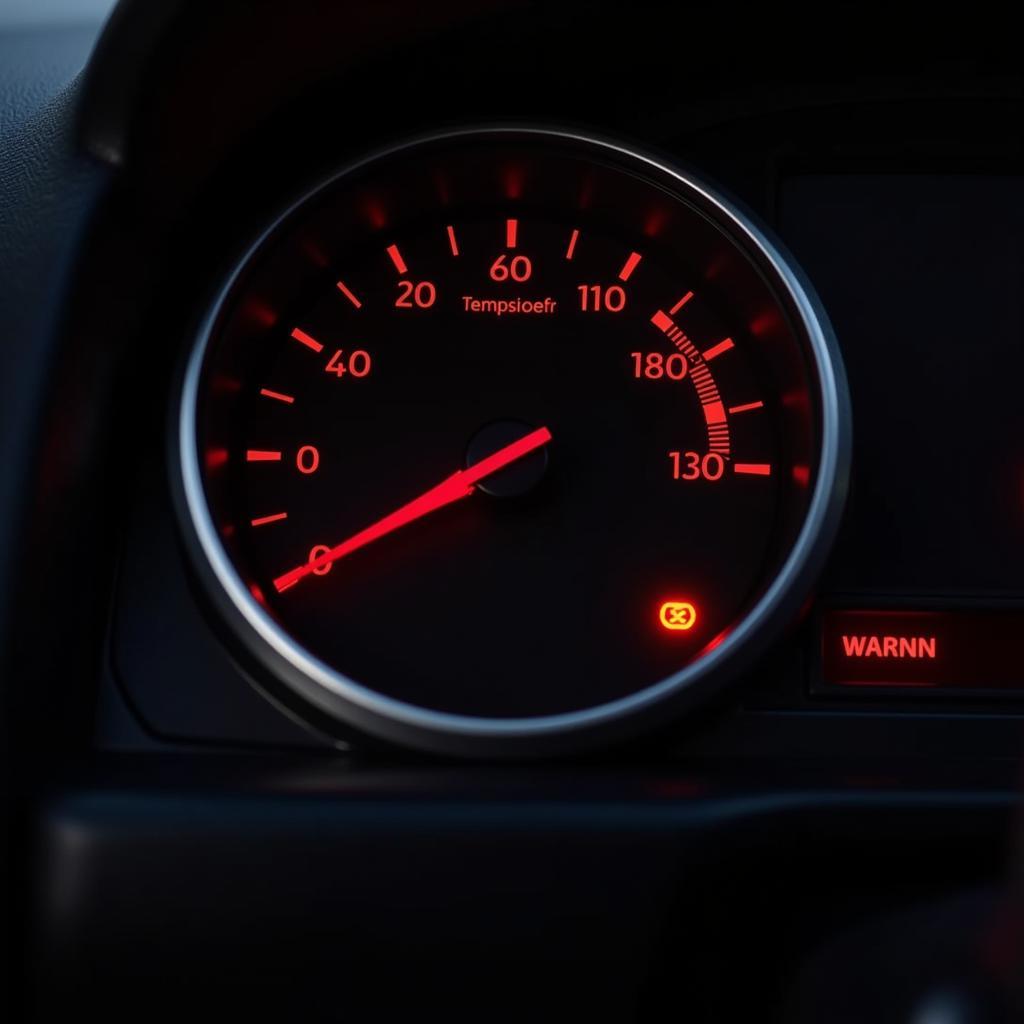If your car is heating up, you’re not alone. Overheating is a common car problem, and figuring out the root cause can be tricky. This article will guide you through the potential culprits, from a simple low coolant level to more complex issues like a failing water pump or a faulty thermostat. Let’s dive in and get your car back to its optimal temperature.
 Car overheating dashboard warning light
Car overheating dashboard warning light
One of the most common reasons for overheating is simply a low coolant level. Check your coolant reservoir when the engine is cold. If it’s low, top it off with the correct coolant type. car thermostat problem symptoms can mimic other issues, so it’s important to diagnose this correctly.
Common Culprits Behind an Overheating Engine
Several components work together to keep your car’s engine cool. A problem with any of these can cause overheating.
Low Coolant: The Usual Suspect
Often, the first thing to check is your coolant level. A leak in the cooling system can lead to low coolant, causing the engine to overheat. Check for leaks around the radiator, hoses, and water pump.
Thermostat Troubles: Stuck in the Closed Position
A faulty thermostat that’s stuck closed prevents coolant from circulating properly, leading to overheating. This is a relatively inexpensive part to replace, but it’s crucial for proper engine temperature regulation.
Radiator Issues: Clogged or Leaking
A clogged radiator restricts coolant flow, causing the engine to heat up. Debris, rust, and other contaminants can build up inside the radiator over time. A leaking radiator also contributes to low coolant levels and overheating.
Water Pump Woes: No Flow, No Go
The water pump circulates coolant throughout the engine. A failing water pump can’t effectively circulate coolant, causing the engine to overheat. You might hear a whining noise if your water pump is failing.
Why is My Car Overheating So Quickly?
Sometimes, overheating can happen suddenly. This could be due to a sudden catastrophic failure like a burst hose or a sudden blockage in the cooling system.
Sudden Coolant Loss: A Burst Hose or Radiator
A burst hose or radiator can lead to rapid coolant loss and a quickly overheating engine. This usually requires immediate attention.
Fan Malfunction: Not Enough Airflow
The cooling fan helps dissipate heat from the radiator. If the fan isn’t working correctly, the engine can overheat, especially at low speeds or when idling.
“A common mistake people make is ignoring the temperature gauge,” says John Miller, a seasoned automotive technician with over 20 years of experience. “Regularly checking your gauges can help prevent major engine damage.”
My Car is Heating Up But No Leaks: What Now?
Even if you don’t see any visible leaks, your car can still overheat. Internal leaks, like a blown head gasket, can be harder to detect and require professional diagnosis. troubleshooting car problems white smoke coming can be related to this as well. different car problem sounds may also provide clues as to what is going on under the hood. Sometimes a car problems funny picture can alleviate some of the stress that comes along with car problems.
Head Gasket Failure: A Serious Issue
A blown head gasket allows coolant to leak into the engine cylinders or oil passages. This can cause serious engine damage and requires immediate repair. White smoke from the exhaust is a common symptom of a blown head gasket.
Clogged Heater Core: Restricted Coolant Flow
A clogged heater core can also restrict coolant flow and contribute to overheating. This might also result in a lack of heat from your car’s heater.
“Don’t underestimate the importance of regular maintenance,” advises Sarah Chen, a certified mechanic and automotive instructor. “Regular coolant flushes and inspections can prevent many overheating issues.” probleme frigo camping car thetford shows that regular maintenance is important, even for RV refrigerators.
Conclusion
If your car is heating up, it’s important to address the issue promptly to avoid further damage. From a simple low coolant level to more serious problems like a blown head gasket, understanding the potential causes can help you take the right steps to get your car back on the road safely. Don’t hesitate to contact us at AutoTipPro for assistance. Our phone number is +1 (641) 206-8880 and our office is located at 500 N St Mary’s St, San Antonio, TX 78205, United States.






Leave a Reply